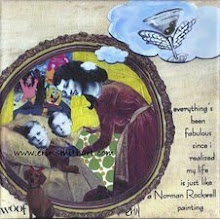Pandemic as defined is "an epidemic of infectious disease that is spreading through human populations across a large region; for instance a continent, or even worldwide." If we were to equate domestic violence (DV) abusers to an infectious disease (which I quite like), then this definition works. Abusers certainly destroy more lives and kill more people every day than H1N1, and yet we hear little public outcry for a 'vaccine' or 'cure.' DV happens to people in every race, socioeconomic status, religion, age, sexual orientation, and education level as abusers do not discriminate. The spread of DV goes unchecked when we turn a blind eye and say that it is a private matter, when our law enforcement or laws fail to protect our citizens, and when our society condones many of the behaviors of abusers while blaming the victims.
October is Domestic Violence Awareness Month. In my former life, before staying home with the kids, I coordinated the 24 hour crisis line at Domestic Abuse Intervention Services (DAIS) in Dane County, WI. It's a hard job and even when you leave the field, you never leave the work behind. It stays with you, forever changing you.
The following video is a story that aired in Madison, WI, but it could have been told in any town. Leigh Mills and my friend Shannon Barry do an excellent job covering the domestic murder of Francie Weber by her husband who committed suicide. I cannot even imagine how Francie's niece Letitia got through this interview or how her children get through each day. The story in itself is not unique, but therein lies the problem. It's happening EVERY DAY in this country and across our world.
I could go on and on about this subject, about how you know or perhaps are a victim or survivor of domestic violence, or about how serious and wide spread this is. DV can be physical, sexual, verbal, emotional, or financial, and it is about power and control and entitlement. We as a community must stand up and hold abusers accountable. I could talk about why it is NEVER the victim's fault and that there are many legitimate reasons for staying in an abusive relationship. I could tell you that DV victims (and their kids) are at far greater risk of being seriously injured or killed by the abuser once they separate from them and even years after leaving. Instead I'll just ask that you take a couple of minutes to watch the story as they all did a phenomenal job portraying the reality that is domestic violence.
If the video doesn't work, click HERE.
Powerful, wasn't it? DV advocacy by itself is very important to me, but sadly I've been introduced to another layer and that is DV among my new community of families who have a child with special needs. This, my friends is something that I rarely hear discussed.
I know that I am blessed to have a wonderful husband and extended family. I've developed some amazing friendships since Sophie entered my world and have grown closer to old friends. My support system is strong. My access to Early Intervention is good. My love for my daughter is deep.
Sadly, not all parents who have children with special needs have as many resources. Many struggle through each day in ways I cannot imagine. Even more tragic is the fact that much of the abuse of children with special needs is sustained by the hand of a parent or caregiver. Imagine, if you will, a home where the mother experiences domestic violence. Imagine then what the life of a child with special needs is like as they witness this abuse or are directly abused. These families are even more isolated and at more risk for serious trauma and injury.
What can be done? Volunteer or donate money or needed items to your local DV program. Join online forums for special needs and offer your support. downsyn for families and friends of a loved one with Ds is my favorite forum. Be a friend and listen, keeping your eyes and ears open.
I'll leave you with one last set of stats taken from the ARC:
- 1 in 3 children with disabilities are victims of some form of abuse, sexual abuse, or neglect. (Sullivan & Knutson, 2000).
- Individuals with developmental disabilities are 4 to 10 more times more likely to be victims of a crime than people without disabilities (Sobsey, et al., 1995).
- Children with developmental disabilities are at twice the risk of physical and sexual abuse compared to children without disabilities (Crosse et. al., 1993).
For more information or to get help, please contact:
The National Domestic Violence Hotline at 1-800-799-SAFE
The National Sexual Assault Hotline at 1-800-656-HOPE
Subscribe to:
Post Comments (Atom)











1 comment:
Those of us online who have that support often forget about others who don't. But it just takes a visit to the icad blog, which tracks stories of violence against people with disabilities, to see the sad truth. Here's the website if you haven't been there yet: http://icad.wordpress.com/ Hard to read sometimes, but a wake up call.
Post a Comment